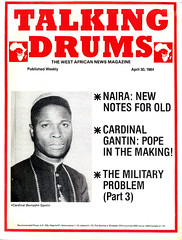Socio-political roots of the Religious problems in Nigeria
Clyde Ahmad Winters
CLYDE AHMAD WINTERS, the writer of this article attempts an analysis of the recurring religious problem in Northern Nigeria. He is an anthropologist-sociologist and at present a director of the Utham dan Fodio Institute, Chicago, Illinois.The political crisis in northern Nigeria emanates from the conflict between Islamic orthodoxy and what many traditional Muslims and members of Maitatsine groups see as contemporary materialism among western oriented Muslim elites and secular modernization.
It would appear that Maitatsine Muslims are disillusioned by the permissive society Nigeria inherited from the British. They feel that this permissiveness encourages corruption of individual Muslims, and their western oriented leaders, which they view as turning away from Islam, to seek the materialism of the Western inspired consumption oriented society of contemporary Nigeria.
Although the term Maitatsine was originally applied to the followers of Muhammadu Marwa, alias Maitatsine, this word has become a generic term for all Muslim fanatics in northern Nigeria.
The conflict between secular modernization and Islamic modernization results from the fact that secular modernization seeks the betterment of a few while the majority are alienated, Islamic modernization on the other hand seeks man's betterment in terms of the common good through social solidarity. Thus, Islamic progress, if it is based on the shari'a, is maintained when social relations are characterized by justice and social collectivity based on brotherhood; as opposed to secular modernization and its resulting social disintegration.
Muslim social structure has evolved in Nigeria due to Westernization. Today westernized Muslims are a cultural minority in most Muslim com munities due to the poverty of the Muslim masses.
Class distinctions in the Muslim community were increased during the Nigerian oil boom, and under the Shagari government, as western-oriented Muslims assumed new and important roles in the Federal government and economy.
The policies of the Shagari government in relation to Muslims is the root cause of religious rioting in northern Nigeria. Under former president Shagari, progressive western oriented Sunni Muslim groups and their leaders were generally afforded a great deal of direct and indirect government support. In the past four years as the stature and economic base of the traditional Muslim ulema, and their pupils has declined, that of the Western Oriented Muslim Middle Class (WOMMC) has soared higher and higher.
The basic shortcoming of the Shagari regime was that it continued the practice of the late Ahmadu Bello, premier of the north of measuring Muslim progress in the number of Muslims occupying government post. Since a western education was a re- quirement for acquisition of govern- ment post, the WOMMC has evolved into a cultural minority which is estranged from the poorer Muslim masses who are predominantly inclined towards sufism.
CONFRONTATION
Such groups as the Jamaat Izala, and other anti-sufi groups inspired by Sheikh Abubakar Mahmoud Gumi, are radicalizing the sufis, who are arming themselves in self defence. In addition to the Maitatsine groups stocking arms in fear of a confrontation with Jamaat Izala and other anti-sufis, that refer to sufis as kafir, the Tijjaniyya order has created a paramilitary wing called Jundullah dedicated to their physical protection. Moreover some of the Federal government's policy in the area of education appear to be also causing religious rioting in some post primary schools throughout the north, since they conflict with the Islamic values Muslim youth have learned at home or in makaranta (Quranic schools) they at tended before entering government supported schools.Both the sunni and sufis claim that they are seeking an Islamic society. Thus, the conflict between Nigeria's diverse Muslim groups would appear to be the result of the competition between two contrasting cultures one western-oriented and the other traditional, rather than a conflict between the basic principles of Islam.
While the WOMMC promotes an ideology of individual social mobility, the Maitatsine groups and other traditional Muslims, due to life in the Jamaat specific compound of most wards in northern Nigerian urban centres, stress self-help and collective social mobility.
The compound is the basic unit of the northern Nigerian social structure. The compound is very important to the Maitatsine social environment and group solidarity. Membership in the Maitatsine brotherhood and life in Jamaat specific compounds - due to shared belief, and the pooling of resources appear to create consensus and homeostasis within these groups.
The Jamaat specific compound attracts rural migrants and the unemployed because here monies collected by members of the Jamaat from employment or the begging of the alamajili (students), can be collectively used for the betterment of the entire Jamaat. The organization of the Jamaat specific compound provides a smooth transition for the recent rural immigrant to the city, in the face of pervasive urban unemployment and underdevelopment in the North.
This is the result of the schism between the traditional ulema and the peasantry. This running sore within the Muslim community can only be healed by the government seriously examining con temporary northern Nigeria Muslim society to find out the root causes of the religious discontent. Because it is clear that looking at the religious problems in northern Nigeria solely from the perspective of the WOMMC will do nothing to solve the deteriorating social relations in northern Nigeria.
